Letter from Joseph Priestley Jr. to John Beckley

Joseph Priestley Jr. writes to John Beckley and asks about having a tract of land surveyed on behalf of his father, Dr. Joseph Priestley, who is "very unwell."


Joseph Priestley Jr. writes to John Beckley and asks about having a tract of land surveyed on behalf of his father, Dr. Joseph Priestley, who is "very unwell."
Dr. Joseph Priestley writes to James Taylor with instructions regarding which picture of Dr. Priestley should be used. "The picture taken of me by Stewart at the request of the Philosophical Society is much better than that taken by Mr.

A six page bibliography of 75 books written by Dr. Joseph Priestley.

While Charles Nisbet wrote "Hints on Education" around the time he became the first President of Dickinson College around 1785, it was not published in The Port Folio until 1812. Transcript included.

An anonymous author writes this essay on the history of Dickinson College, which is published in The Port Folio, vol. 5 (March 1811): 239-246. This essay is published with B.
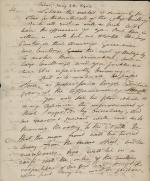
Dickinson College trustee Hugh Henry Brackenridge writes to another trustee, James Hamilton, and further discusses Benjamin Latrobe's design for the new building (West College) at the school. Transcript included.
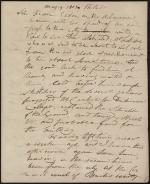
Dickinson College trustee Hugh Henry Brackenridge writes to trustee James Hamilton about architect Benjamin Latrobe's plans for a new building (West College). Transcript included.
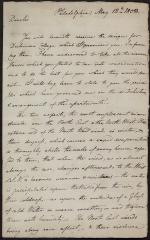
Benjamin Latrobe, the architect of Old West, writes to Dickinson College trustee Hugh Henry Brackenridge and explains his plan as well as his design choices for the building. This letter accompanies his sketches for the new building.
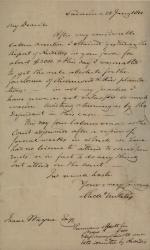
A lawyer writes Isaac Wayne (Class of 1792) to inform him that a "Report of Auditor" had been issued "in your favor for about $3000" and had obtained the foreclosure of a plantation.
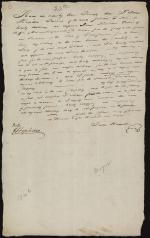
James Hamilton Sr. signs this power of attorney to grant James Houston the legal authority to act on his behalf on various financial matters.

James Hamilton Sr. uses this letter of attorney to provide John Vaughan of Philadelphia with the legal authority to lease or sell lands that the Commonwealth of Pennsylvania has granted to Pennsylvania's officers and soldiers.
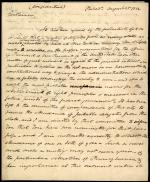
John Bradford Wallace writes to Robert Coleman and James Hopkins, who have been nominated to a secret meeting of Federalists in New York.
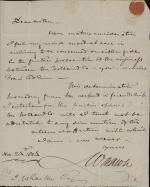
Attorney William Rawle writes to Isaac Wharton and explains his decision to not take sides in the prosecution of the Holland Company.
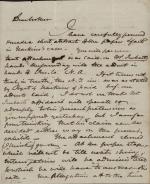
Attorney William Rawle writes to Isaac Wharton and discusses a legal case. "His claim can be decided either way on the present exhibits," as Rawle explains.

W. P. Maclay writes to his aunt, Isabella Bell, regarding the recent death of his father.

Attorney Horace Binney writes to his colleague William Rawle, enclosing an agreement in the case of Butler v. Cadwalader.
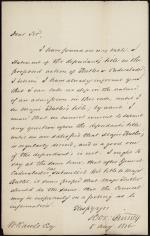
Attorney Horace Binney writes to his colleague William Rawle, asking for the defendant's title in the case of Butler v. Cadwalader.
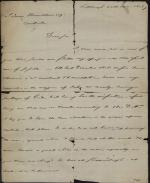
Joseph St. Leger d'Happart writes to James Hamilton, , a lawyer and member of the Dickinson College Board of Trustees, about various business affairs.
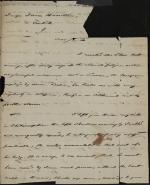
Joseph St. Leger d'Happart writes to James Hamilton about travelling from Carlisle to Pittsburgh as well as business during the trip.

Joseph St.
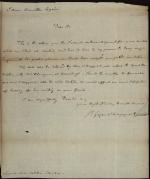
Joseph St. Leger d'Happart writes to James Hamilton, a lawyer and member of the Dickinson College Board of Trustees, thanking him for the pleasant stay while in Carlisle, Pennsylvania.
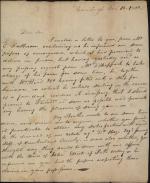
William A. Thompson writes to James Hamilton and informs him that he must proceed to Philadelphia "to take charge of [St. Leger D'Happart's] farm" and will be unable to visit as a result.

J. M. Thompson writes to James Hamilton, a lawyer and member of the Dickinson College Board of Trustees, about the failure of the governor to commission Mr. Steel as a coroner.

John Thompson writes to attorney and Dickinson College trustee James Hamilton regarding a judgment for forty-eight pounds that Mr. Watts obtained against Thompson. "There is no such sum due them by me," as Thompson argues.
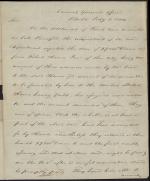
Callender Irvine writes to Alexander J. Dallas about settlement of the account of Tench Coxe. As money is owed to the United States, Irvine notes that the possibility of a lawsuit exists.